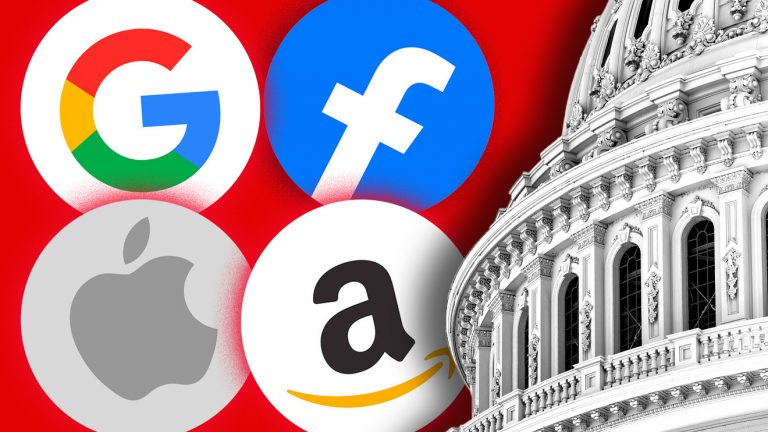
The Ending Platform Monopolies Act was just proposed in the Senate with bipartisan support. This bill would split up big tech companies or force them to spin off divisions into separate businesses.
By Nazarul Islam
America’s two political parties, the Republicans and Democrats tend to agree very little on issues, these days. One supposed leap of faith has arisen from the fact that members of both parties are in agreement —that Big Tech needs to be broken up. Though their motives are different, they’re happy to join forces for this particular goal. The Ending Platform Monopolies Act was just proposed in the Senate with bipartisan support. This bill would split up big tech companies or force them to spin off divisions into separate businesses.
For example, YouTube would probably become independent from Google. Instagram might be separated from Facebook. Perhaps Whole Foods would be spun back out of Amazon.
Although Republicans and Democrats have different motives, many people of both political ideologies support the measure for different reasons. And they’re all wrong.
Democrats want to do it because they believe that big business is bad. Any company that makes “too much money” must be stealing it. Progressives believe that economics is a zero-sum game, so if someone gains money, someone else must have lost that money. Of course, centuries of free market economics have disproved this concept.
In a free market, a rising tide raises all boats. In other words, free markets result in prosperity for all who are willing and able to labor, produce goods, and trade. America has proven this for almost two and a half centuries.
But progressive Democrats believe that money corrupts. And big companies will, like the proverbial snowball rolling downhill, increase in size until it become infinitely large, unless some good intentioned government official stops it. While physics tells us that the snowball will eventually stop rolling on its own, economics tells us the same about giant companies.
Look at IBM, a company that seemed unstoppable from its founding in the early 20th century though the late 20th century until a couple of kids in their Cupertino, California garage knocked it from its perch as the top tech company with their Apple computer. Or look at General Electric, the world leader in technology about a century ago, but barely in the top 40 now and sinking every year.
And if the goal is to reduce the wealth in the hands of a few individuals, look to Standard Oil. Its founder and chairman, John Rockefeller, became even richer after its government-mandated breakup in 1911.
Republicans are also wrong. They want to break up Big Tech to stop censorship of conservatives on platforms like Facebook, Twitter, and Amazon.
But how does breaking up these companies help? It actually results in multiple companies that are all run by progressive high-tech Millennials. Breaking them up doesn’t bring in new, conservative leadership. It does nothing to change the culture at these companies. It will just result in many Mini Techs that operate just as Big Tech does now.
And eventually the companies will reconstitute themselves. Look at AT&T. It was broken up in 1984 and eventually re-formed and became even bigger than before. This will happen even faster to the Mini Techs because in cyberspace there are no advantages of locality. It’s not like customers will drive to the closest mini Google or mini Amazon.
Every Internet site is as easily accessible as any other Internet site. When one Mini Tech becomes popular, it will drive out competitors just like Google drove out AltaVista and, and drove Yahoo! into a different business model. Just like Facebook drove out America Online and Myspace. Just like Amazon drove out Webvan.
The solution is to harness market forces, not government regulation. In addition, a strong patent system is needed to enable individual entrepreneurs and small startups to develop new technology, get investment, and compete. Just like Bill Gates did – And Steve Jobs and Steve Wozniak, and Jeff Bezos, like Henry Ford did, and Thomas Edison too.
Government regulation of business is rarely the solution. If you really don’t like Big Tech, first lobby our politicians, Republicans and Democrats to eliminate Section 230 of the Communications Decency Act of 1996 that gives Big Tech government-mandated protection from lawsuits about the control they exercise over content on their sites.
Second, stop using their products and services. It will be difficult, but most things worth doing are difficult. Or start your own high-tech competitor. If you’re an engineer, develop the software and hardware. If you’re a businessperson, manage the company. If you’re a financial person, raise funds. If you’re an average consumer, patronize the new company.
Alternatives to Big Tech that support free speech like Parler and Gab Social and Rumble are already coming into being. Find the sites you do like and support them. Patronize them. This is America, and this is how things are supposed to work here.
[author title=”Nazarul Islam” image=”https://sindhcourier.com/wp-content/uploads/2021/05/Nazarul-Islam-2.png”]The Bengal-born writer Nazarul Islam is a senior educationist based in USA. He writes for Sindh Courier and the newspapers of Bangladesh, India and America. He is author of a recently published book ‘Chasing Hope’ – a compilation of his 119 articles.[/author]